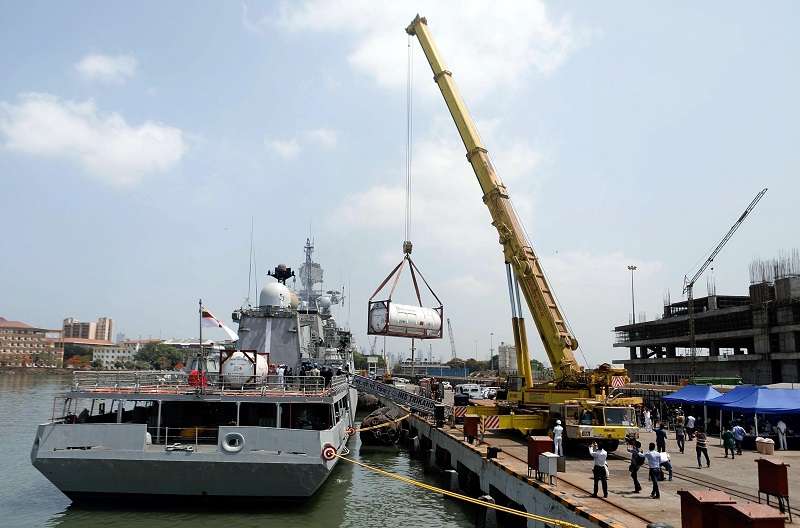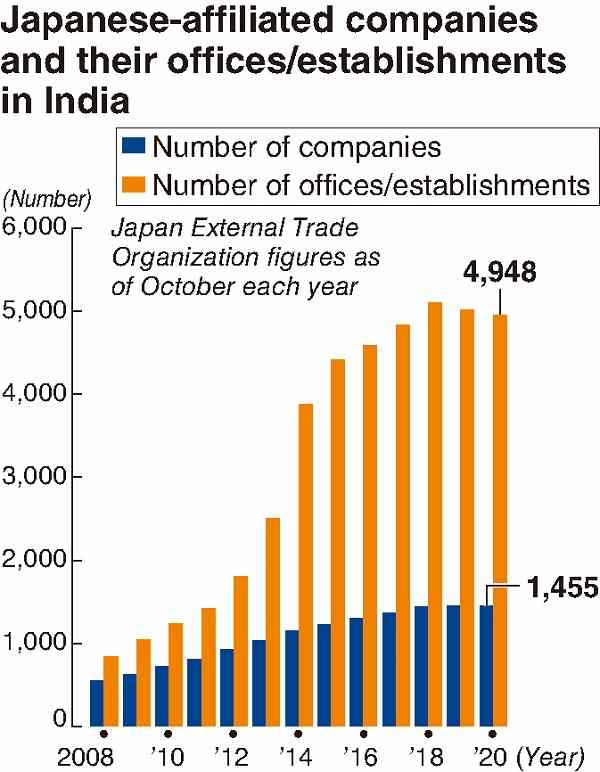
A crane lifts a tank of liquid oxygen on Monday that was shipped from Qatar to Mumbai.
15:15 JST, May 15, 2021
BANGKOK — The unrelenting spread of the novel coronavirus in India is having an increasingly severe impact on Japanese companies operating in the country, with firms forced to suspend factory operations or pull employees back to Japan.
If it takes a long time to bring the virus situation under control in India, there are fears that the pandemic will sting the business performance of Japanese companies operating there, especially in the automobile and electrical goods industries.
India has recently been recording more than 300,000 new coronavirus cases per day. Restrictions on activities in the metropolitan area around New Delhi have been extended until Monday, and a wave of infections is also sweeping through regions where medical care systems are fragile.
According to the Japan External Trade Organization (JETRO), 1,455 Japanese-affiliated companies had factories, sales branches or other business establishments in India as of October 2020. Some companies had kept their Japanese employees in India allowing them to work from home as the pandemic spread, but now such workers are being recalled to Japan.
Shipping company Kawasaki Kisen Kaisha, Ltd. has already brought back all of its employees who had been stationed in India. Sony Group Corp. also plans to recall all of its Japanese employees from India this month. According to All Nippon Airways and Japan Airlines, which operate direct flights to and from India, seat occupancy rates on flights back to Japan have been rising as more companies repatriate their employees.
Requests for oxygen
Some companies operating in India also have shut down their factories as part of measures to prevent employees from catching the virus. Hospitals across India are facing a shortage of medical oxygen used to treat coronavirus patients, so many companies there — including Japanese-affiliated businesses — are being asked to provide oxygen normally used in manufacturing processes.
Suzuki Motor Corp., the parent company of one of India’s major carmakers, has stopped production at three manufacturing plants until Sunday. Honda Motor Co.’s Indian arm has paused production until Tuesday, and Yamaha Motor Co. will suspend motorcycle production at two plants in India from Saturday until May 31. Toyota Motor Corp. has halted operations until May 21 at its vehicle manufacturing factory in Karnataka State, where a lockdown is in effect.
Toyota’s parts manufacturing plant in that state also has been closed since May 10. Toyota makes models including the Yaris and Camry in India. About 40 seconded employees work at the two plants, and those wishing to temporarily return to Japan will be permitted to do so.
Electronics makers are in a similar position. Panasonic Corp.’s refrigerator and air conditioner plant in the northern state of Haryana has been mothballed since April 27. This halt in operations initially was scheduled to last until May 3, but has been extended until Sunday due to the worsening coronavirus situation.
With a population of more than 1.3 billion people, India ranks among the world’s top five nations for automobile production volume — behind the likes of the United States and China. In April, 261,633 domestically manufactured passenger vehicles were sold in India, a drop of about 10% from the previous month. Lockdowns in various states meant many sales outlets were closed.
Business performance hit

Uncertainty created by the coronavirus pandemic has made forecasting business results more difficult for some companies.
Suzuki, which relies on the Indian market for over 30% of its sales, announced Thursday that its forecasts for consolidated operating results in the business year through March 2022 were “undetermined.” In an online press conference, Suzuki Motor President Toshihiro Suzuki said some customers had had falls in revenue, and others had postponed purchases of high-priced models.
Indian Prime Minister Narendra Modi is still unwilling to impose a nationwide lockdown due to concerns about the possible impact such a step would have on India’s economy. However, India’s vaccine rollout has been slow, and any delay in bringing the virus under control could deliver an even greater hit to the economy.
“Since Japan’s Golden Week holiday period ended in early May, a growing number of Japanese-affiliated companies have been temporarily recalling employees stationed in India back to Japan, leaving only the bare minimum of essential personnel here,” said Yasuyuki Murahashi, chief director general of JETRO’s New Delhi office. “As things stand, it remains difficult to tell whether Indian authorities will introduce even stricter lockdowns.”
Top Articles in Business
-

Prudential Life Insurance Plans to Fully Compensate for Damages Caused by Fraudulent Actions Without Waiting for Third-Party Committee Review
-

Narita Airport, Startup in Japan Demonstrate Machine to Compress Clothes for Tourists to Prevent People from Abandoning Suitcases
-

Japan, U.S. Name 3 Inaugural Investment Projects; Reached Agreement After Considerable Difficulty
-

Toyota Motor Group Firm to Sell Clean Energy Greenhouses for Strawberries
-

SoftBank Launches AI Service for Call Centers That Converts Harsh Customer Voices into Softer Voices
JN ACCESS RANKING
-

Japan PM Takaichi’s Cabinet Resigns en Masse
-

Japan Institute to Use Domestic Commercial Optical Lattice Clock to Set Japan Standard Time
-

Israeli Ambassador to Japan Speaks about Japan’s Role in the Reconstruction of Gaza
-

Man Infected with Measles Reportedly Dined at Restaurant in Tokyo Station
-

Videos Plagiarized, Reposted with False Subtitles Claiming ‘Ryukyu Belongs to China’; Anti-China False Information Also Posted in Japan





















